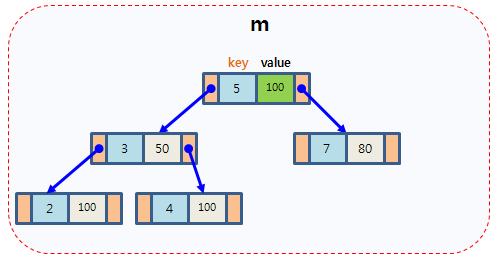STL - Map 基础
Map 基础:
关于Map容器:
map以模板(泛型)方式实现,可以存储任意类型的数据,包括使用者自定义的数据类型。Map主要用于资料一对一映射(one-to-one)的情況,map內部的实现自建一颗红黑树,这颗树具有对数据自动排序的功能。在map内部所有的数据都是有序的,后边我们会见识到有序的好处。比如一个班级中,每个学生的学号跟他的姓名就存在著一对一映射的关系。
1、Map的使用
//1.需要导入头文件 #include <map> //2.map 对象是一个模版类,需要关键字和存储对象两个模版参数 std::map<int , std::string> person; //3.可以对模版进行类型定义使其使用方便 typedef std::map<int , std::string> MAP_INI_STRING; MAP_INI_STRING person;
2、Map 的构造
//1.map 最基本的构造函数; std::map<int , std::string> mapPerson; //2.insert 函数插入 pair 数据 std::map < int , std::string > mapPerson; mapPerson.insert(pair < int,string > (1,"Jim")); //insert 函数插入 value_type 数据 mapPerson.insert(std::map < int, std::string > ::value_type (2, "Tom")); //用数组方式插入数据 mapPerson[3] = "Jerry"; //C++ 11 标准中,还为 map 容器增添了移动构造函数。当有临时的 map 对象作为参数,传递给要初始化的 map 容器时,此时就会调用移动构造函数。 #创建一个会返回临时 map 对象的函数 std::map<std::string,int> disMap() { std::map<std::string, int>tempMap{ {"C语言教程",10},{"STL教程",20} }; return tempMap; } //调用 map 类模板的移动构造函数创建 newMap 容器 std::map<std::string, int>newMap(disMap());
3、Map 数据的遍历
//1.前向迭代器 std::map < int ,std::string > ::iterator it; std::map < int ,std::string > ::iterator itEnd; it = mapPerson.begin(); itEnd = mapPerson.end(); while (it != itEnd) { cout<<it->first<<' '<<it->second<<endl; it++; }//2.反向迭代器 std::map < int, string > ::reverse_iterator iter; for(iter = mapPerson.rbegin(); iter != mapPerson.rend(); iter++) cout<<iter->first<<" "<<iter->second<<endl;//3.数组形式 mapPerson.insert(std::map<int, std::string>::value_type (1, "Tom")); mapPerson[2] = "Jim"; mapPerson[3] = "Jerry"; int nSize = mapPerson.size(); for(int n = 1; n <= nSize; n++) qDebug()<<QString::fromStdString(mapPerson[n]); //注意:三种都是遍历,建议使用前向迭代器,慎用使用数组形成(角标开始位置谨慎)。
4、map 中元素的查找
//find() 函数返回一个迭代器指向键值为 key 的元素,如果没找到就返回指向 map 尾部的迭代器。 map<int ,string > ::iterator l_it;; l_it = maplive.find(112); if(l_it == maplive.end()) cout<<"we do not find 112"<<endl; else cout<<"wo find 112"<<endl;
5、map 中元素的删除:
iterator erase(iterator it) ;//通过一个条目对象删除 iterator erase(iterator first,iterator last); //删除一个范围 size_type erase(const Key&key); //通过关键字删除 clear();//就相当于enumMap.erase(enumMap.begin(),enumMap.end());
6、map 中 swap 的用法:
//注意:Map 中的 swap 不是一个容器中的元素交换,而是两个容器交换; #include <map> #include <iostream> using namespace std; int main( ) { map < int, int > m1, m2, m3; map < int, int >::iterator m1_Iter; m1.insert ( pair < int, int > ( 1, 10 ) ); m1.insert ( pair < int, int > ( 2, 20 ) ); m1.insert ( pair < int, int > ( 3, 30 ) ); m2.insert ( pair < int, int > ( 10, 100 ) ); m2.insert ( pair < int, int > ( 20, 200 ) ); m3.insert ( pair < int, int > ( 30, 300 ) ); cout << "The original map m1 is:"; for ( m1_Iter = m1.begin( ); m1_Iter != m1.end( ); m1_Iter++ ) cout << " " << m1_Iter->second; cout << "." << endl; // This is the member function version of swap //m2 is said to be the argument map; m1 the target map m1.swap( m2 ); cout << "After swapping with m2, map m1 is:"; for ( m1_Iter = m1.begin( ); m1_Iter != m1.end( ); m1_Iter++ ) cout << " " << m1_Iter -> second; cout << "." << endl; cout << "After swapping with m2, map m2 is:"; for ( m1_Iter = m2.begin( ); m1_Iter != m2.end( ); m1_Iter++ ) cout << " " << m1_Iter -> second; cout << "." << endl; // This is the specialized template version of swap swap( m1, m3 ); cout << "After swapping with m3, map m1 is:"; for ( m1_Iter = m1.begin( ); m1_Iter != m1.end( ); m1_Iter++ ) cout << " " << m1_Iter -> second; cout << "." << endl; }
7、map 的 sort 问题:
//注意:Map 中的元素是自动按 key 升序排序,所以不能对 map 用 sort 函数: #include <map> #include <iostream> using namespace std; int main( ) { map < int, int > m1; map < int, int >::iterator m1_Iter; m1.insert ( pair < int, int > ( 1, 20 ) ); m1.insert ( pair < int, int > ( 4, 40 ) ); m1.insert ( pair < int, int > ( 3, 60 ) ); m1.insert ( pair < int, int > ( 2, 50 ) ); m1.insert ( pair < int, int > ( 6, 40 ) ); m1.insert ( pair < int, int > ( 7, 30 ) ); cout << "The original map m1 is:"<<endl; for ( m1_Iter = m1.begin( ); m1_Iter != m1.end( ); m1_Iter++ ) cout << m1_Iter->first<<" "<<m1_Iter->second<<endl; }
8、map 的基本操作函数:
begin() 返回指向 map 头部的迭代器 clear() 删除所有元素 count() 返回指定元素出现的次数 empty() 如果 map 为空则返回 true end() 返回指向 map 末尾的迭代器 equal_range() 返回特殊条目的迭代器对 erase() 删除一个元素 find() 查找一个元素 get_allocator() 返回map的配置器 insert() 插入元素 key_comp() 返回比较元素key的函数 lower_bound() 返回键值>=给定元素的第一个位置 max_size() 返回可以容纳的最大元素个数 rbegin() 返回一个指向map尾部的逆向迭代器 rend() 返回一个指向map头部的逆向迭代器 size() 返回map中元素的个数 swap() 交换两个map upper_bound() 返回键值>给定元素的第一个位置 value_comp() 返回比较元素value的函数



 浙公网安备 33010602011771号
浙公网安备 33010602011771号